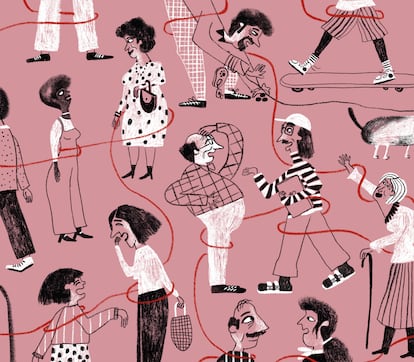Intergenerational friendships have the power to enrich your life
Relationships between young and older people are an undiscovered area of psychology. Several psychological studies explore the effects of these interactions on mental health

Released in the fall of 1989, Steel Magnolias is a film that tells the heartwarming story of friendship between three generations of women. Set in a hair salon, the women gather to share their fears, doubts, experiences and joys, transcending generational barriers. Unlike our usual interactions, which often involve connecting with people of the same age, style and beliefs, intergenerational friendships are often overlooked and seen as unbalanced. Traditionally, younger generations receive support while older generations provide advice. However, recent studies show that these relationships bring mutual benefits and extend beyond a simple teacher-student connection.
According to a recent New York Times article, intergenerational friendships can bring fresh perspectives and break down generational stereotypes. Telling your story to someone of a different age fosters respectful and prudent dialogue, while lessening the inevitable generational comparisons. A 2021 study published in the Cogitatio scientific journal also found that these friendships promote social inclusion and counteract age discrimination.
In the exchange of stories between generations, the past and future are reconstructed. Each generation has different values and needs, but judgments are tempered. Learning from history requires younger ones to be aware of the struggles and sacrifices made by previous generations, which brings a greater responsibility for protecting civil and human rights. Having older friends can also provide access to job opportunities that may not be available through other networks. Older people appreciate their own experiences more as they relive the past and rediscover their passion. When conversing with younger generations, they are pleasantly surprised by their awareness, sensitivity to injustice, and willingness to learn from mistakes and successes. This influence fuels the desire to stay active and engaged, as well as the importance of continuous learning and keeping up with technology.
To cultivate generational interactions, people should start by showing interest in learning about the lives and interests of people of different ages. This can be done at work, book clubs, universities, and neighborhoods. A group trip can also provide opportunities for fellowship and relationship building. But, like any friendship, it’s commitment that forms a deeper bond. With unwanted loneliness increasing among both the elderly and young, fostering intergenerational connections and creating inclusive spaces is more vital than ever. Longer lifespans make this exchange increasingly common for achieving a dynamic social structure. Projects like Grandes Amigos in Spain that promote friendships with the elderly have a significant impact on mental health through mutual support and care.
True friendship develops when there are no barriers. A good friend in Buddhism is called kalyana mitta — the virtuous friend. Buddhist teachings emphasize that favoring exclusive friendships is an obstacle to universal friendship. Therefore, it is our moral duty to intentionally nurture diverse friendships. This benefits not only ourselves but also others who become part of our legacy, as poet Emily Dickinson eloquently wrote. The cycle of life ensures that youth will inevitably give way to old age.
Sign up for our weekly newsletter to get more English-language news coverage from EL PAÍS USA Edition
Tu suscripción se está usando en otro dispositivo
¿Quieres añadir otro usuario a tu suscripción?
Si continúas leyendo en este dispositivo, no se podrá leer en el otro.
FlechaTu suscripción se está usando en otro dispositivo y solo puedes acceder a EL PAÍS desde un dispositivo a la vez.
Si quieres compartir tu cuenta, cambia tu suscripción a la modalidad Premium, así podrás añadir otro usuario. Cada uno accederá con su propia cuenta de email, lo que os permitirá personalizar vuestra experiencia en EL PAÍS.
¿Tienes una suscripción de empresa? Accede aquí para contratar más cuentas.
En el caso de no saber quién está usando tu cuenta, te recomendamos cambiar tu contraseña aquí.
Si decides continuar compartiendo tu cuenta, este mensaje se mostrará en tu dispositivo y en el de la otra persona que está usando tu cuenta de forma indefinida, afectando a tu experiencia de lectura. Puedes consultar aquí los términos y condiciones de la suscripción digital.








































